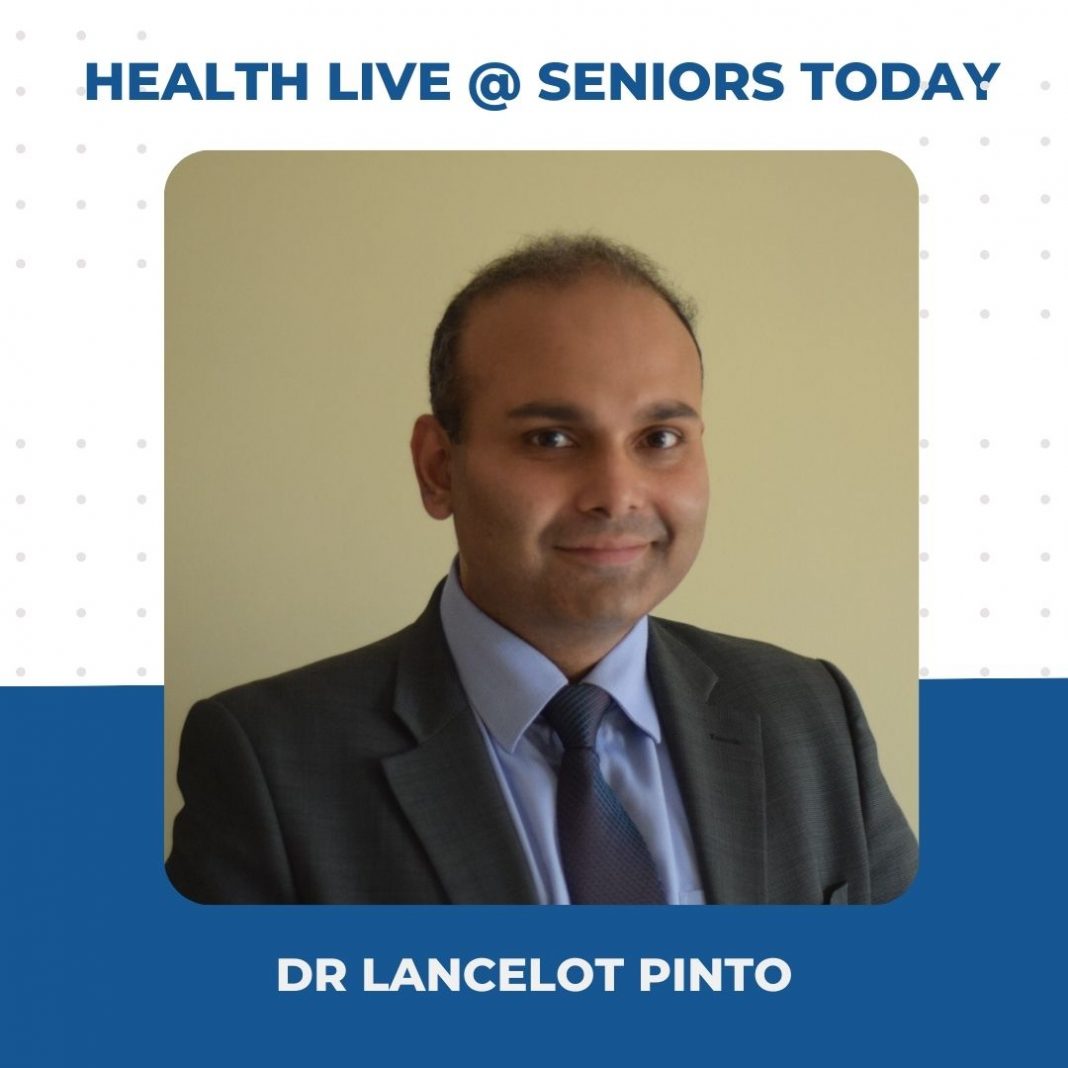On January 30, 2021, Seniors Today conducted a Health Live webinar with Dr Lancelot Pinto on better sleep health of senior citizens. Dr Noor Gill captures the highlights.
Dr Pinto is a leading respirologist at the P D Hinduja National Hospital and Medical Research Centre, Mumbai. He was a gold medal recipient at the DNB examinations in respiratory diseases in 2009, and trained at the McGill University, Montreal, Canada from 2010-2014, during which he completed a Masters degree in Epidemiology, and clinical fellowships in Sleep Medicine and COPD rehabilitation. He has a keen interest in research, and has over 60 peer-reviewed publications, and is a peer-reviewer for a number of leading journals in the field. He has also collaborated with the University of Cape Town, consulted for the World Health Organisation and USAID, and continues to collaborate with McGill University. His main areas of interest include management of severe COPD, drug-resistant TB, smoking cessation therapy, and the management of sleep disorders.
Here are takeaways from the session:
– The principles of sleep remain constant for the young and the elderly. People assume a lot of things about the elderly patterns of sleep, like sleep patterns get shorter and the elderly needs lesser hours of sleep, but a lot of that is not true.
In the 1960s, at the University of Chicago, a lot of research started being done in the context of sleep and to try to understand why we slept? The Tetris Experiment was performed where the experimental population was taught the game of Tetris- which involves stacking the blocks in a line and involves a lot of spatial understanding and quick reflexes. Half of the population was thence to sleep and the other half was sleep deprived. They found that the individuals who slept for more dance 6 hours after learning a new task improved while those who didn’t, did not. Suggesting that sleep played a role in:
- Finesse
- In improving your understanding of things
- Improving your skills and ability to perform complex task.
Another bunch of math chat experiments were done at the University of Lubeck, Germany, in 2004 where individuals were given a math problem and the math problem had two ways of solving – a complicated one and a simpler/ shortcut way. They allowed half of the individuals to sleep well and the other half was sleep deprived. It was found that when the individuals returned to the problem later on, those who had slept well were twice as likely to find the simpler way as compared to those who had not slept well. It suggested that when it comes to analysis, understanding things better sleep plays an important role.
– Glymphatic system: Just like you have toxins accumulating in your body that are cleared out by the lymphatic system, there is a similar system in the brain called the glymphatic system. Whenever the brain works throughout the day- when intense thinking is involved, memory, etc. some of these toxins are generated in the brain and tend to be cleared out in the night. The glymphatic system works in full drive at night, clearing out the brain and refreshing it.
– In certain neurodegenerative diseases such as Alzheimer’s, the stuff that accumulates in the brain may very well be the toxins that were not removed at night.
– Lack of sleep has the potential to pause accumulation of the substances.
– There is a strong association between depression and insomnia. It is a chicken-and-egg situation where we don’t know whether it is the depression that causes the insomnia or if it is the Insomnia that triggers the depression.
– What happens when one doesn’t sleep?
Another experiment was done on a bunch of mice where the mice were placed in the centre of a chamber with water around it. Every time the mice would fall asleep it would fall into the water and wake up and jump back to the centre and so on. It was an inhumane experiment, yes. But what they found was that within 32 days all the mice died of sleep deprivation. A similar experiment was performed on humans at the Guantanamo Bay, where the individuals were kept awake for torture and interrogation purposes. It was found that the lack of sleep also causes:
- A rise in the cortisol levels (stress hormone)
- Increase in the thyroid levels
- Rise in the blood pressure was also noted.
- Individuals tend to crave more carbohydrates
- The body temperature falls
- The immune responses become suppressed thereby predisposing the individual to infections.
- Simple cognitive tasks become challenging.
- Reaction time significantly slows down- this has an important role when it comes to traffic accidents. One accident per hour is a consequence of sleep deprivation.
– An average of seven to nine hours of sleep is required. A minimum of 8 hours of sleep is recommended. It is still possible that you may need more but 8 hours is the minimum recommendation.
– There is a circadian rhythm in the body. There is a light and darkness pattern, a body clock. Some people say that they work better in the morning while others work best at night. They are traditionally called larks and owls. Unfortunately the way our lives are designed the owls have a hard time adjusting and sometimes even struggle with the “early to bed and early to rise system” that we follow. Individuals who working shift find it very challenging as well.
– All of us have devices such as phones, laptops, tablets, etc.- these devices give our brain a lot of light. There is a small gland at the back of our brain which is called the pineal gland. This pineal gland converts light into trying to figure out if it is day or night and it secretes melatonin accordingly. So if it is night time melatonin is secreted which helps you transition to darkness. But if we expose the brain to tremendous amounts of light which the devices tend to, the brain gets confused. The brain thinks it’s still day time and therefore has trouble falling asleep.
These devices are very common cause of insomnia.
Sleep changes as one ages:
– As you grow older, you tend to get tired earlier in the afternoon and then you wake up earlier in the morning. This is called phase shift. The biological clock moves in such a way that for some reason you wake up earlier in the morning and you feel sleepy earlier in the day. This does not mean that you need shorter hours of sleep. You still require your eight hours of good sleep.
– The elderly have trouble initiating sleep and when they do fall asleep, it is more often than not interrupted. This is because the elderly tend to have lesser REM sleep i.e the deeper parts of the sleep tend to be lesser/ shorter and these individuals tend to be a lighter sleepers.
– More daytime somnolence. Which is a consequence of the fragmented sleep which is not optimal. 25% of elderly tend to nap during the day. This as a consequence also increases the tendency for falls.
– Difficulty in adapting to disruptions. Asyou grow older, your capacity to pull all-nighters decreases. Which is why it is very important to set a schedule as you grow older
- Older individuals that don’t sleep well are more likely to suffer from depression. Nine out of 10 patients that come to Dr Pinto with the complaint of insomnia, Dr Pinto has observed, is a symptom and not the disease. If the Insomnia is a symptom, as a result of a major life event, which has triggered off the insomnia, it is very likely that the trigger that has caused the depression, is what is causing the insomnia. Hence, the trigger is the real problem and the insomnia is just a manifestation of it. And fixing it which sleeping pills is something Dr Pinto strongly recommends against.
- Adults who don’t sleep well tend to have attention and memory problems.
- Insufficient sleep can also lead to diseases such as heart diseases, diabetes and it has also been associated with breast cancer in women.
- If you have joint pains, osteoarthritis, rheumatoid arthritis or any other disease/ problem which causes joint pains or pain otherwise, it too can cause an interruption in your sleep.
- A lot of adult males have prostate issues as they grow older and as a result awaken during the night to pass urine. This also disrupts ones sleep.
- Take a look at the medications that you are on. Alot of medications for hypertension, cardiac issues and other medications can cause insomnia as a side effect. If that is the case, request your doctor to change your prescription.
- Restless Leg Syndrome: Individuals have the desire to frequently shake aur move that legs. It usually happens during the end of the day and that irritability in the leg is what disrupts your sleep and doesn’t allow you to fall asleep.
- REM sleep behaviour disorder: It is where the individuals act their dreams out. When they are in the deeper parts of the sleep, they start to move their limbs, flail their arms and legs around and can injure themselves.
Dr Pinto has a simple questionnaire that you can fill out to find out if you are a sleepy person. If the answer to the questionnaire is yes, you might want to look into why you are sleepy.
Obstructive Sleep Apnoea:
The windpipe is a soft tissue (which has no bones for support) falls to the back of the throat and impedes the passage of air through the trachea. When you sleep flat on your back at night, your body goes into a state of paralysis and the brain has to work very hard to keep the windpipe from going floppy and it does so with the help of muscles which are called the dilators which open the windpipe. But when there is a lot of fat around the neck, if the individual is obese, people with small chins, square faces, etc. the windpipe struggles to stay open. When the windpipe struggles to stay open a sound is produced while breathing. When we normally breathe, no sound is produced but when the windpipe is partially shut the vibrations of the windpipe causes the sound of snoring. When you snore, if your oxygen levels dip that is what sleep apnoea is.
– Its incidence is more in men as compared to premenopausal women but postmenopausal women have the same incidence as men.
Signs and symptoms:
Daytime symptoms –
- It reduces the oxygen supply and can lead to high blood pressure.
- It also fragments your sleep and so when your oxygen levels go down, your brain at a subconscious level wakes you up and when you wake up your oxygen level comes up again and when you go back to sleep it goes down again and this tends to lead to very fragmented sleep. Itleads to sleep which is not of good quality as a result of which people with sleep apnoea tend to be
- sleepy during the day
- They tend to be depressed, irritable
- They lack energy
- Do not wake up feeling refreshed.
- They also have problems with concentration and memory.
It is usually the partner/ spouse who diagnoses the apnoea
- The patient complaints of wake up suddenly/ with a jerk.
- There can be choking
- The urge to pass urine at night frequently is also a symptom of sleep apnea
- Sexual dysfunction
- Cardiac arrhythmias
- The individual tends to sweat a lot at night But the number 1 symptom is loud snoring.
- If you are a smoker, overweight, have a positive family history of sleep apnea you are at a higher risk.
- As you grow older the probability of sleep apnea increases. This is because the muscles become more and more relaxed as you grow older.
- Alcohol and use of sedative drugs worsen sleep apnea.
- A C-PAP is used for the treatment of sleep apnea. All it does is, it pushes air at a higher pressure. It is the pressure of the air itself that opens up the windpipe.
- Precautions that you can take for a better night;s sleep:–
- If you consume caffeine or nicotine in any form- as soda, aerated drinks, coffee, tea, cigarette, etc have them before 2pm.. As you grow older your body’s ability to metabolise caffeine decreases.
- Take short naps during the day. 15 to 30 minutes is okay. The longer the nap, the less likely it is that you will fall asleep better at night
- Quick, warm bath/showers before bed help you sleep better at night. It lowers the body temperature.
- Avoid using/ looking at a screen 45 minutes before bedtime. Avoid keeping the television in your bedroom
- Never smoke in bed.
- If you want to go to the washroom in the middle of the night keep the lights turned off, make sure that there are no rugs, mats that you can slip on, chairs you can bump into,on your way to the bathroom.




